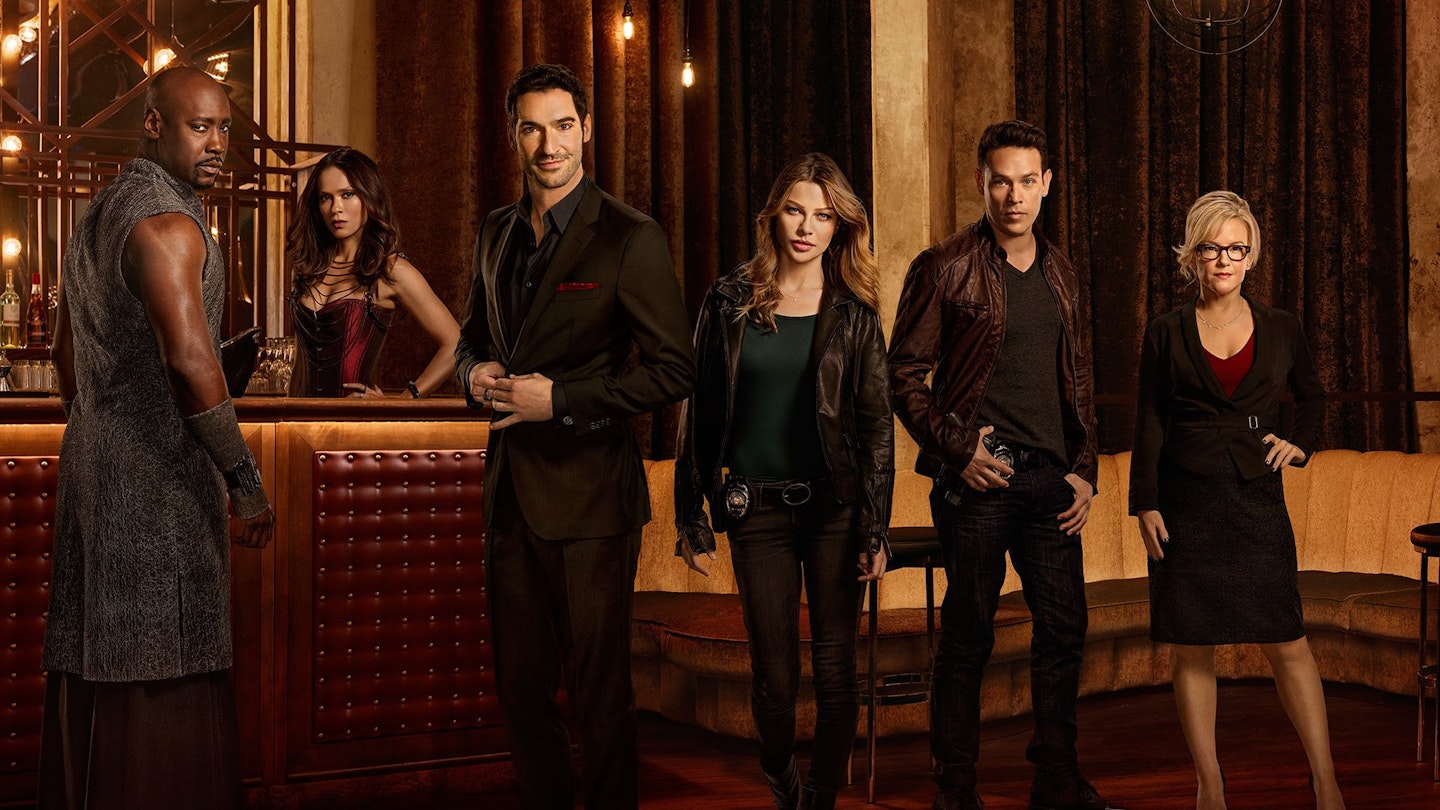Lucifer completes its first season run, with (naturally) a cliffhanger of sorts that will lead into next year. The show, in brief, focuses on Lucifer Morningstar (Tom Ellis) - the Devil himself - who has decided to leave Hell behind and run a piano bar in Los Angeles. There, through the investigation of the death of a human friend, he finds himself paired up (in a manner of speaking) with Detective Chloe Decker (Lauren German). While amused by the notion of using his abilities to help her solve crimes, he simultaneously has to fight off the efforts of his brother, the angel Amenadiel (D.B. Woodside), to get him return to his proper place as the ruler of the underworld.
Through exclusive interviews with executive producers Joe Henderson and Ildy Modovich, Empire takes a behind the scenes look back at the show's first season.
The Devil As Hero
Joe Henderson: Early on, the way I wrapped my brain around the idea of the Devil as our protagonist is that this character is a wayward son who fought with his dad and lost and was kicked out. Now he wants to make his own path. Then I said, "And he's the Devil." But that was secondary. Really, it's me when I stood up to my own dad because I wanted to be my own man. Tom Kapinos, who wrote the pilot, so smartly gave Lucifer this aloof sort of, "I'm so funny, I'm so clever" attitude, but with a touch of regret and humanity that you realize he's hiding beneath it all. From there, honestly, you write things that Tom Ellis is going to make sound awesome.
Fool 'Em With Humor
Ildy Modrovich: I felt that you could get away with so much by having a character as irreverent as Lucifer. All of the other heaven and hell things are always so serious with flames and fire and brimstone. To me, the way to actually discuss something is to fool people with comedy. Get them kind of hooked, and then you can actually explore things. There are some moments in the show where we actually get some discussion of theology in there. It's not palatable to people if you just cram it down their throat. But how is it not fascinating to take the biggest, baddest villain of all time and find some heart in there and explore who he is? I think the whole show is about looking at different perspectives and turning things on their head if possible. Looking at somebody's perspective you normally wouldn't look at. He's the embodiment of that. If you're trying to redeem the biggest bad guy, it's kind of beautiful. And when I really looked at the story of the Devil, which is more in Dante's Inferno than The Bible, I thought, "God, this guy really was misunderstood." As a writer, that's such a great challenge and so juicy, because I guess it is controversial. But when there are four hundred and thirty something scripted shows on TV, you kind of do look for something that provokes a little thought and a little controversy. It's not like you look for it on purpose, but you're drawn to those things.
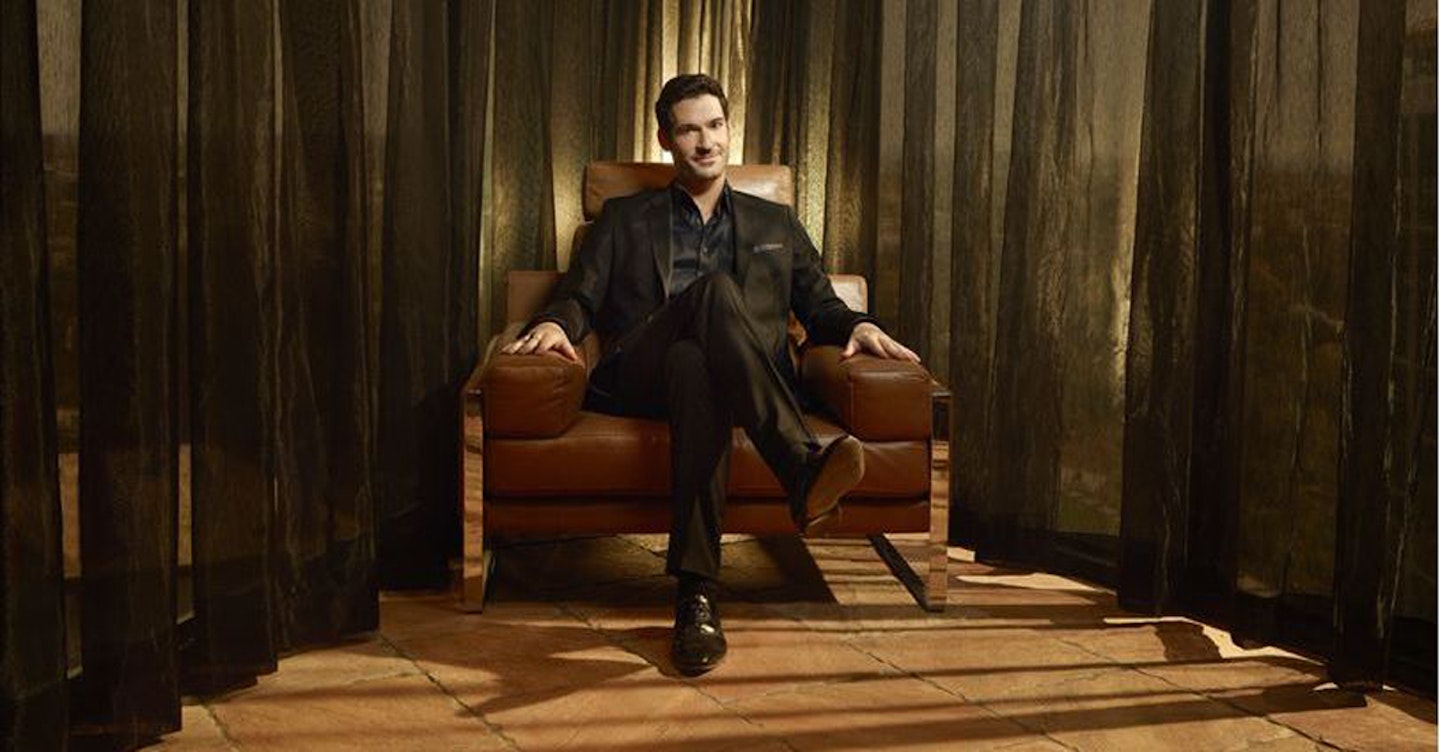
Taking Procedure Out of Procedural
Henderson: When I first came on the show, and being a huge fan of the comic, I was, like, "Are they really going to make a show where this character that I love is going around solving crime?" Then when I watched the pilot I realized that the procedural is just an engine that lets us play with the characters. I hope it's something we really got good at in the back half where the cases are used to help illustrate our characters and their journeys. One of the things we had on our side is that no one expected the show to be good [laughs]. I love those lowered expectations, because if people really watched the show, they really liked it.
Modrovich: This shows doesn't allow the normal way into a procedural. You don't have The Mentalist or Sherlock wanting either to solve puzzles or say, "I'm going to stay up for five days until I find out who did this." He the Devil. He doesn't give a shit. It's a tricky thing to do a cop show where your lead "detective" doesn't care for the normal reasons. That's been the challenge, but that's a fun challenge.
A Kick To The Balls
Henderson: Something we wanted to do was mix the procedural with the supernatural. The big thing we built the second episode - "Sit, Lucifer. Good Devil" - around was what if Lucifer prays to bring down Amenadiel, and uses it to help save the day? That's where we began to find the mix and match of the mythological and the case of the week. The other thing is, "What's our sense of humor?" At about two in the morning I just had this image of a guy in slow-mo and Lucifer kicks him in the balls. I came into the writers' room the next morning and said, "This is either the best or the worst idea ever." Everyone laughed and I said I was being serious. We talked about what our show is, and it's funny how those little moments can help in the development of the tone of the show. The whole time watching it I thought, "Wow, I just put a kick-to-the-balls joke in the first episode of this show that I'm doing." But it works, because it's Lucifer seeing an opportunity and taking it. It came from character even if it is a crude joke.
Slow Down, You Move Too Fast
Modrovich: Our third episode is "The Would Be Prince Of Darkness," but that took some gymnastics. That was originally episode ten, but we needed to slow down the mythology; that Lucifer was getting to be too vulnerable too quickly. We wanted to put another episode between two and three - we called this one 2.5. The trick was to not feel like we were treading water in that. We basically looked for a meaty theme - does Lucifer's care-free devilish ways cause someone to die? It's the usual it's all fun until some sweet young thing ends up floating in a pool sort of thing. We just wanted to slow play our mythology, so that it's one step forward, two steps back. That's the dance that we play with the romance, too. We decided early on that the most interesting thing to do between Lucifer and Chloe would be to really find something beyond romance, yet Lucifer is all about the Id. What would be meaningful for him would be to have a true connection and trust and friendship and love between he and Chloe, so we knew that was going to take a long time. Kind of the same way as with the mythology. He might make a pass at her which might seem like a step forward in the romance, but then realize that wasn't satisfying and she didn't respond or whatever, and that's two steps back. With the mythology, he might have a flash of humanity, but he's so inherently selfish that he has to almost be afraid of that feeling and back way up from it.
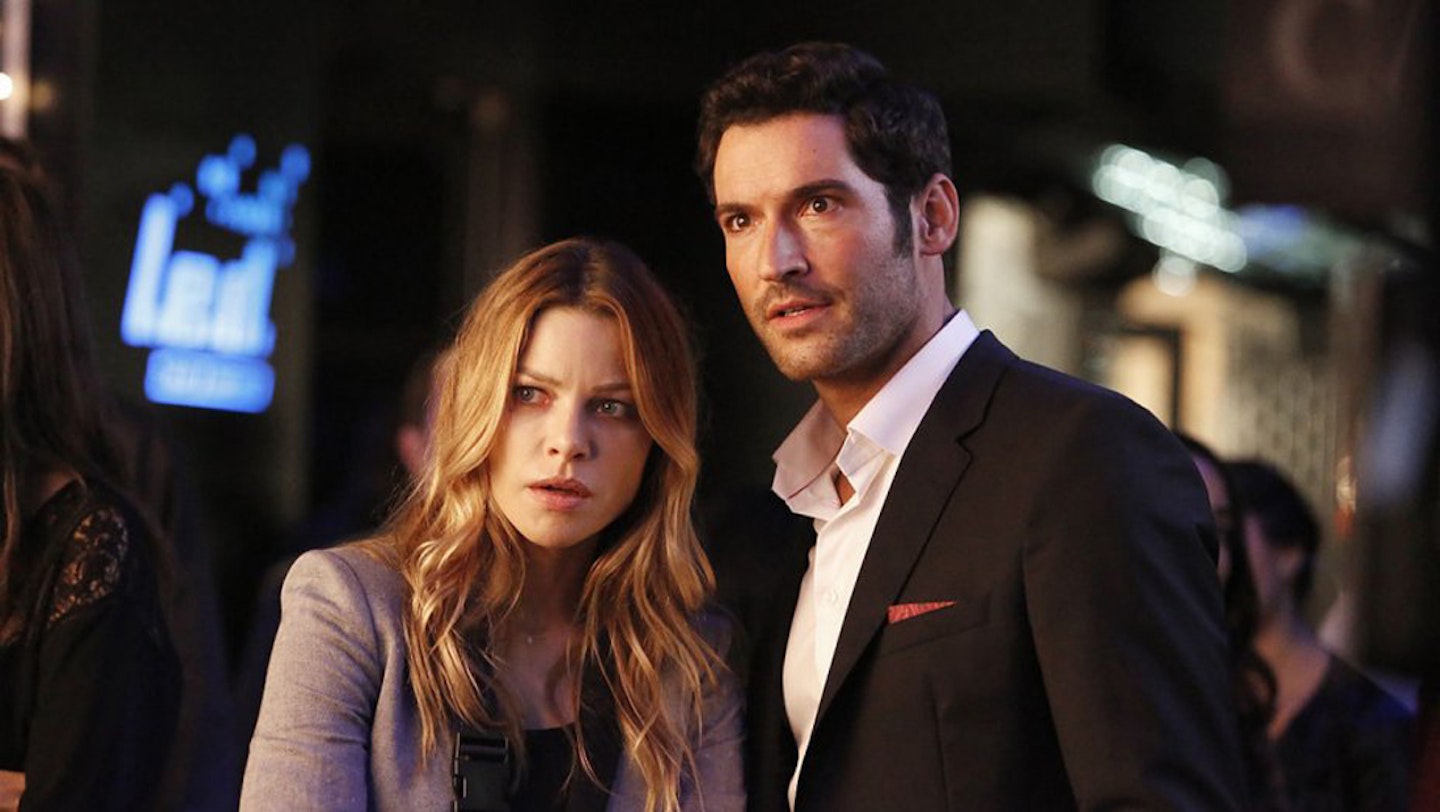
At The Same Time, Keep It Moving
Henderson: Early conversations were to prolong the whole season. One of the things we talked about was building the whole season towards the revelation about Lucifer's wings. What if that was our season finale? But to me, that's a great mid-point, because what you needed to do was show the audience that, yes, we're going to have cases of the week, but we're also going to balance that with episodes that matter. Personally what I loved about Homeland season one was that in episode six they upset the entire cart and told you what was happening. It was what you expected episode twelve to be. So one of the things we wanted to do - and storytelling on TV has changed so much - was to make sure people knew we weren't one of those shows that was going to wait until the finale to pay you off. I decided we would do a mid-season finale even though we didn't have a mid-season.
Wing Wars
Modovich: We had a couple of episodes dealing with Lucifer's wings, and we went through a lot of renderings to get them right. [Director/Producer] Len Wiseman had a lot of say about the wings. They were too small, too big, then they were stiff...just 40 versions between sketches and then just in terms of what was on screen. The visual effects people went back to the drawing board quite a few times; they were very patient. And I think the audience was surprised when, at the end of "Wing Man," Lucifer burned his wings. That's what the best comic books do: they jump off a cliff and worry about how you get out of it later. He needed to cut ties, in our opinion, and make a big move. That also said a lot about his character, because it made you believe he was the same guy who rebelled against dad in heaven. Who did something just completely emotional and dealt with the consequences later.
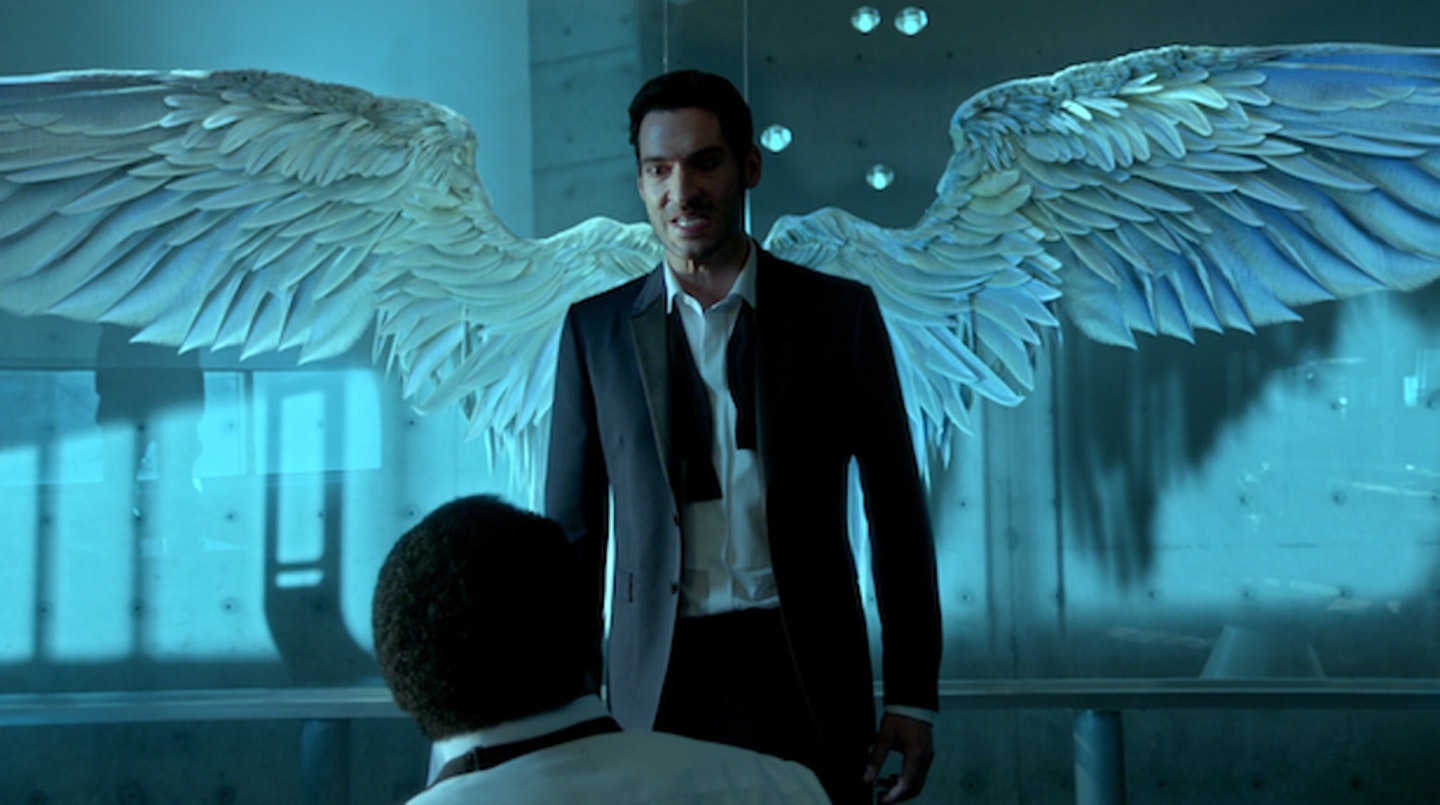
A Personal Touch
Henderson: When you look at an episode like "A Priest Walks Into A Bar," what was really cool about it is that it allowed us to have conversations about faith, about loss, and taking that and incorporating it into the scripts. I think one of the reasons its resonates is that it's a personal script , not just from the writer, Chris Rafferty, but from all of us, because everybody sort of chipped in on where they were on the subject of faith. We've got a couple of religious people on our staff, a number of lapse people, a couple of atheists... a lot of people that have a lot of thoughts on God. And a number of people who have lost others who are important to them. We just had a lot of conversations about that, and that's what fed in to a lot of the theme work. You know, one of the things we set out to do was not make an anti-God show. In fact, you could argue that we're a weirdly Christian show for a show about the Devil, because a lot of what we're talking about is redemption; whether or not doing good deeds can let you come back from a terrible act.
The Art Of The Cliffhanger
Henderson: I like to wrap everything up and then have a cliffhanger that teases what the second season would be, so that worse case is that the fans are happy with what they've got and it's not a feeling of, "Wait, so you didn't answer any of the reason I was watching the show?" But then you give them the ending where the feeling is, "I need a season two." It's a tricky thing to do, but the nice thing about Lucifer is that FOX said, "You can do a cliffhanger," which is great....though I still sweated things out for 10 weeks.
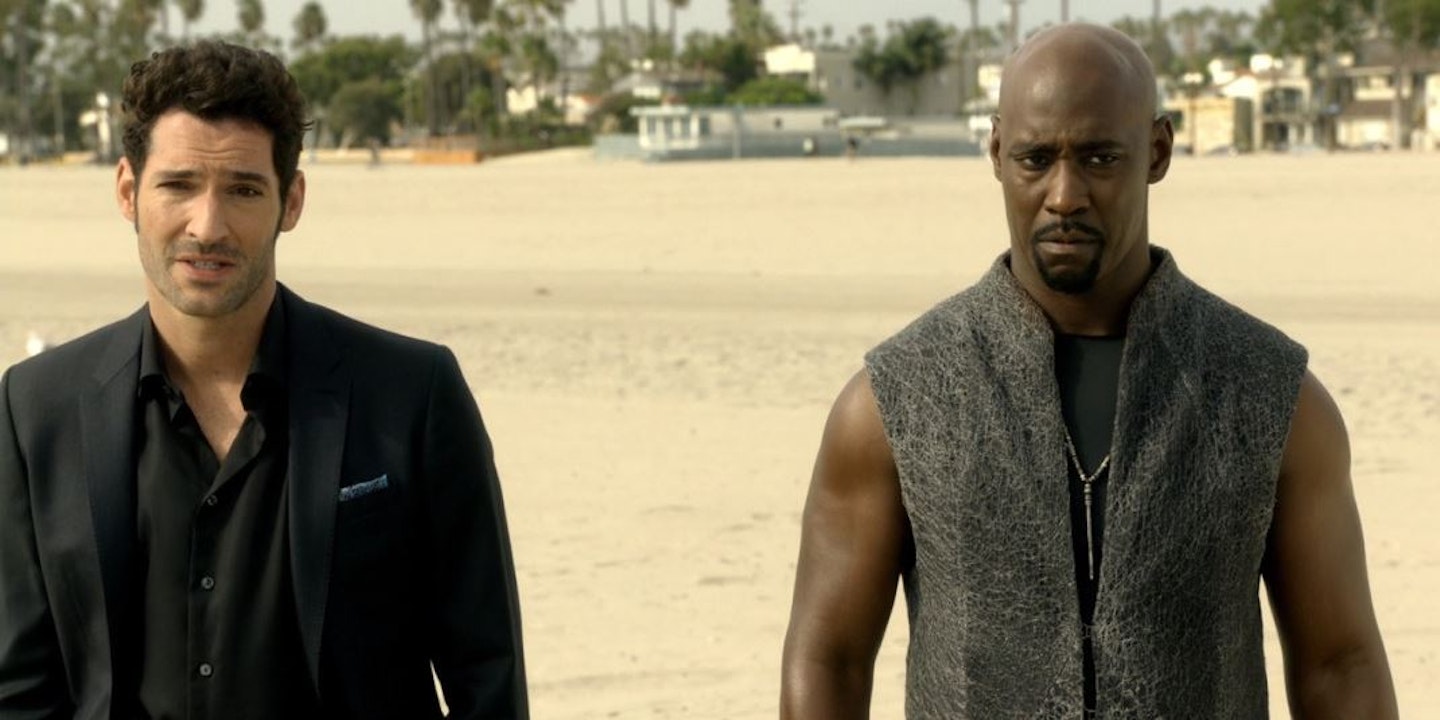
Looking Back, Looking Ahead
Modovich: Because they were at odds, in season two we want to bring the two brothers - Lucifer and Amenadiel - together for a common goal. Amenadiel in particular is going to get pretty interesting, because he completely miscalculated and underestimated humanity in a major way. Instead of being up there looking down at humanity like a bunch of ants - which is where Lucifer was at the beginning of the season - it's going to be a very different situation. And Lucifer will reveal a whole other layer or level to his relationship with Chloe that we will explore.
Henderson: I'm overjoyed that people responded to the show, I'm relieved that I was able to take what I thought was a great pilot and keep it going, and I fell in love with the world and the characters. I cannot wait to start writing season two and to start expanding our world. What we set up is, "Here is Lucifer, here is the show." Now is the time to play with it, to go in weirder or stranger directions, to expand on our cast, to see more combinations of them. We laid the concrete on the playground, and now let's start setting up things to play with. I was going to say, "Let's start to have some fun," but, man, we had a lot of fun in season one.
Lucifer airs on FOX in the US and Amazon Prime Instant Video in the UK.
